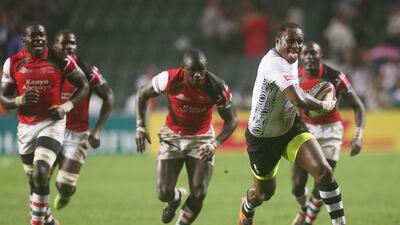Obviously, nobody needs any extra incentive to get excited about the Dubai Sevens weekend.
But if you have a minute to kill and are in front of a tablet, computer or smart phone, type "Pio Tuwai try" into YouTube.
It is the ultimate appetite whetter, with well past 60,000 views already – yet the man who is the subject of said try for Fiji against New Zealand is not even the player who dots it down.
Read more: Fijian legend Waisale Serevi to miss Dubai Rugby Sevens
Tuwai, with all the no-look passes and buccaneering runs, was in a different class in the UAE last year. The Flying Fijian has more flair than the 1970s.
Yet instead of showing off his lavish skills in front of 45,000 people on Pitch 1 at the Sevens and a TV audience stretching to 145 countries this weekend, he is in Sri Lanka playing club rugby.
Fiji have always seen their leading players go abroad to earn fortunes that can be life-changing for their families. But that was always to top-tier nations.
It comes to something when the core of the side who won in Dubai 12 months ago have opted to leave for a country that, at No 48, is 35 places below Fiji in the world rankings.
But no worries, because the well of sevens talent in Fiji is bottomless, right?
“It is bottomless as far as it is the national sport and there are thousands of very good rugby players in Fiji,” said Ben Ryan, the Fiji coach.
“But it is not bottomless in asmuch as, when we identify them, they have very young training ages, and are very young in terms of understanding all the off-field stuff and discipline.
“We have to turn them into international rugby players. It can’t go on like that.”
Since rugby went professional in the mid-1990s, the abbreviated format has always had to gather crumbs from under the rich man’s table.
Even the best have to make do.
New Zealand’s remarkable monopoly on sevens success, for instance, has come about inspite of the fact that the majority of the leading rugby players in the country cannot be considered for selection.
Gordon Tietjens, the coach, has to shop elsewhere. Lucky for New Zealand, then, that he has a remarkable eye for talent.
With Jonah Lomu, Christian Cullen and Joe Rokocoko, Tietjens’s record as a king-maker speaks for itself.
But it is unusual when a national sevens squad is almost entirely different from one season to the next.
“A lot of teams mope that they have lost two or three players from their starting side,” Ryan said.
“We have only got two players who won in Dubai last year.
“We have lost so many, including the first time we have ever had a player of the year [Samisoni Viriviri]. It can’t continue, that is for sure.”
To call Sri Lanka a backwater for rugby is inaccurate. The sport has a long and storied heritage there.
Many involved in rugby in the island nation argue it was more popular than cricket, until Sri Lanka won the 1996 World Cup and Indian cable TV channels became more widely accessible.
“Sri Lanka is steeped in rugby history, but everybody just knows it for cricket,” said Ben Gollings, the leading point-scorer in world series history, who coached there.
“They have quite a lot of financial backing there, and for these Fijian guys, there is the opportunity to go and play some rugby and earn a living out of it.
“That is crucial where they are from. Their national team is huge to them, but also earning a living is up there as well.”
Sri Lanka can lay claim to being one of Asia’s leading rugby nations, after Japan, South Korea and Hong Kong.
But they cannot match Fiji’s contribution to the sport on a global scale.
The first genuine icon of rugby sevens, Waisale Serevi, says his compatriots have every right to put their livelihood ahead of national duty.
“We don’t have a lot of sponsors in Fiji and that is why a lot of players have gone to Sri Lanka, where there is not a lot of rugby,” Serevi said.
“Financially, it is much better for them, because it is much quicker and easier for them to get out of Fiji.
“When you are in the national team, you need something quickly to pay the bills and feed the family when you are away.
“I thank the Sri Lanka rugby union for looking after these players.
“I feel for them, because winning the trophy, winning the World Cup, winning the IRB Sevens Series, it is really good and makes people happy.
“But these boys, they go home and need to feed their family. The rugby union have to fix that as soon as they can, so the boys can stay longer in Fiji.”
pradley@thenational.ae
Follow our sports coverage on twitter at @SprtNationalUAE


